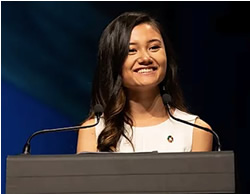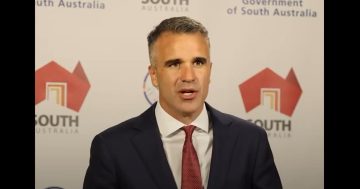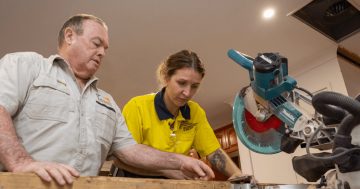Yasmin Poole* says despite Australia’s recent tawdry history of attacks on female parliamentarians, there are still young women who aspire to political representation.

Yasmin Poole
On my 21st birthday, I delivered a speech at the Parliament of Victoria.
I was speaking at a leadership program aimed at empowering young women of colour, a landmark initiative launched by Parliament Victoria.
I looked out into the sea of faces — young women across diverse ethnic backgrounds.
All passionate, inspired and wanting to help shape the society they wished to see.
The walls, on the other hand, were adorned with many portraits of distinguished looking men — and no females.
A visual reminder of how women have, for so long, been excluded from our political institutions.
Yet, here we were.
A group of young women of colour, aspiring to enter into the institutions that have traditionally told us we don’t belong.
To push through cobwebs to demand that we be heard too.
We were breaking the rules, in our own way.
At the time of writing, I should be attending the United Nations’ Commission on the Status of Women — which has unfortunately been postponed due to the coronavirus outbreak.
But, if I was there, I’d share my vision for a gender equal future.
It would be a world where young female politicians are not extraordinary, but normal.
Where Parliament meaningfully engages with girls about their ideas.
Where government policy considers and reflects the needs of young women too.
Yet, the gap between young women and politics remains.
According to Plan International Australia, young women have particularly high rates of disillusionment in politics.
Their faith in their leadership ability also drops substantially after adolescence.
Despite having more female politicians, it’s clear that our implicit political messages still continue to turn girls away.
I believe that these messages emerge from two key barriers.
The first major barrier is the unequal treatment of men and women in Parliament, which can stifle girls’ ambitions.
Women are often celebrated in deputy positions.
But reaching beyond this supportive role to obtain the top leadership position is seen as breaking the rules, even traitorous.
Consider the leadership spills that elevated Malcolm Turnbull and Julia Gillard to power.
Blair Williams, a gender expert from The Australian National Univeristy examined the media response on both occasions in her PhD.
For Turnbull, the media characterised the spill as him “taking back the reins”.
In contrast, Gillard was viewed as a “backstabber”, even evil.
The name “Ju-liar” followed her during her term.
Women are not expected to play by the same rules as men.
They’re still expected to rise above the institution, to clean up men’s mess.
Society’s approval or disapproval of a female politician still continues to reflect hidden biases.
Women are still expected to be smiley, warm and nurturing.
Carefully consider every point of view.
Don’t be too direct — that’s arrogant.
Have kids — but if they’re too young when you go back to work you’re neglectful.
No kids?
You’re frigid.
While not all male leaders are universally liked, women face substantially more rigid, narrow expectations of how they ought to be.
If these standards are just part of the political game, it’s a game where women are designed to fail.
The second barrier is that politicians are still not effectively consulting with young women.
There are a growing number of female political empowerment programs, especially in Australia.
While commendable, we need more mechanisms where girls can also put the ideas to our elected representatives instead of simply doing the listening.
I am a strong advocate for a Federal youth advisory board made up of 50 per cent young women.
This is one initiative that demonstrates Parliament’s willingness to create better youth policy and create space for girls too.
We often see inspiring women on the front line of movements, like #MeToo and the School Strike for Climate.
But we also must create clearer pathways for women to enter into our political institutions and change them from the inside out.
One day, I hope to walk through Parliament and see the many portraits of inspiring female leaders adorning its walls.
It’s time we commit to empowering the next generation of young female leaders, turning their dreams into a vision, building their hopes into aspiration.
If we want to move forward, this is the step we need to take.
* Yasmin Poole is Plan International’s Youth Ambassador, focusing on engaging young Australian women in politics. She tweets at @yasmin_poole. Her website is www.yasminpoole.com.
This article first appeared at www.broadagenda.com.au.











